- Home
- Jaye Wells
High Lonesome Sound Page 3
High Lonesome Sound Read online
Page 3
Behind him farther still was New York, where his editor crafted emails and filled his voicemail with requests for book updates. After the initial conversations about the new story idea and his promise to deliver it by the end of the summer, he’d avoided contact. He convinced himself his creativity needed free rein, but really it was because Allison insisted on bringing up Renee every time they spoke. Her apologies rang hollow without a promise to cancel the memoir, or at least give him the right to read it before it hit the shelves.
He lifted his cell phone from the passenger seat to check if she’d called again, but, seeing the No Service warning, he laughed and tossed the damned thing onto the floorboards.
The lack of a signal prevented him from pulling up the written directions from the owner of the cabin, but he’d memorized her email.
Look for the wooden Moon Hollow sign and turn right. Follow that road until you see the church. You can’t miss it.
—Lettie Bascom
He'd found the listing for the cabin in Moon Hollow a couple of weeks earlier. When he’d called about renting it, the Bascom woman had sounded old enough to be Methuselah's mother, but she'd informed him that she had the only property for rent in the area. She’d gone on to demand letters of reference and a hefty deposit in cash to secure the two-week rental. But the place had looked perfect for his purposes, and he’d been feeling adventurous, so he’d jumped through her hoops and got his agent to write the recommendation.
“Are you certain you want to spend time alone in the wilds of Virginia?” His agent, Bill, had stuck with him through his early success and more recent slump. He was of the old school of career-building agents who believed you don’t just dump a client because they were going through a rough patch. Plus, Bill was the majority partner in the agency, so he could do whatever the hell he wanted—including keeping a loser on his list. Still, Peter’s ego didn’t love being kept on the roster out of habit or, worse, pity.
“It’s the only way this book’s going to get written,” he’d said. “Raleigh’s too haunted for me right now. Besides, I won’t be alone. The cabin is five minutes from town. I’ll be back in a couple of weeks with the start of a bestseller for you.”
He had to be back in time to teach summer school at Wake Tech. As much as he hated the necessity of that job, it would keep him afloat until his book hit it big.
“All right, Peter. I’ll send the letter.” A heavy sigh had come through the line. It was the same sigh that had preceded Bill informing him that sales of his last book hadn’t met expectations.
He rounded a bend and saw a wooden sign on the right side of the road up ahead. The writing was so faded that he had to pull over and get out to read it.
When he stepped out of the car, his loafers gritted against the dirt and pine needles. He paused and listened. The complete silence of the mountain pass pressed in on him. His chest tightened with something close to dread, which confused him. Silence should feel peaceful, shouldn't it?
He wrote off the feeling as the by-product of having lived in cities for most of his life and approached the plywood sign. Red paint formed the words Moon Hollow and underneath that Psalm 55:23.
A narrow gravel road broke away from the highway about fifteen feet from where he stood. Surely that wasn't the road into town.
He got back in and inched the car forward to peer down the road. The tunnel created by the trees on either side of the shadowed lane prevented him from seeing where it led, but it didn’t look like the sort of road one would take into a town. He put the car into gear and continued down the highway to find a proper exit. But two miles later, he gave up and turned back around.
He stopped the car beside the sign and watched it, as if it might suddenly offer up new information. In the mottled light, the drips of red paint on the sign looked like blood. His hyperactive imagination had helped him get three books published, but when it came to his life off the page, it was a nuisance. Since he wrote horror, a lot of people expected him to be a scary guy, but in reality, he was a bundle of neuroses camouflaged by a large ego. He spent most of his time terrified of the real world—a hazard of the fiction trade. In his books, he was the fickle god who could create or destroy according to his whim. The stark contrast between the control he had in his fictional worlds and his utter lack of power in the real world made time spent in the latter almost unbearable.
Still, that biblical sign was the sort of detail that made his imagination fire off like a bottle rocket. He grabbed the pad of paper he kept for such occasions and jotted down the chapter and verse for later.
It really did look like blood.
He closed his lids and rolled his eyes back and forth as if to wipe the image from the screen, but when he opened them again, those letters still spooked him.
Rebelling against his bastard of an imagination, he put his foot on the pedal. The car jerked, sliding on the gravel. He flipped on the headlights to fight the deepening shadows and pressed on toward Moon Hollow.
After about a quarter of a mile, the gravel gave way to dirt. Deep grooves in the surface indicated regular use by other vehicles. Half a mile later, the road curved sharply and gravel gave way to proper paving. As he emerged from the cover of the trees, he found himself at the top of a hill and began a slow descent into the valley. A few buildings and a church squatted in the hollow between two large hills, and on the way down, a few roads veered off with signs warning trespassers away. House-shaped shadows squatted among the thick trees and hills, but the closer he got to town, the nearer to the road the houses had been built.
It was still early, about eight in the morning, but a couple of porches along the way already featured gray-haired sentinels who waved arthritic claws as he passed. He waved back and felt some of his worries evaporate. So far, Moon Hollow seemed like something out of Rockwell’s America.
A few shops lined the main road, but they failed to grab his attention. How could they when they competed with the church at the dead end of the only road in town?
According to his research, Christ the Redeemer Church had been the first structure built in Moon Hollow—even before Jeremiah Moon’s house, which reportedly still stood further up the mountain. At the time, the population of Moon Hollow was five—Jeremiah, his wife Annie, and their three children—two boys and a girl. The youngest boy, Ian, died during a typhoid outbreak in 1887. Despite his relatively small family for the era, Jeremiah built the church large enough to accommodate a congregation of nearly one hundred.
Once word spread across the mountain that Moon was building the church, people came to get a look at what folks in the region were calling "Moon's Folly." But strangely, the men who came to gape and tease were quickly charmed by the charismatic Jeremiah Moon and soon found themselves with hammer in hand. Thus, by the time the church was completed, it already had a full congregation.
The church was a marvel of mountain ingenuity. The wooden pews and altar were all carved from local hardwood. Thick pine trunks stripped of bark and polished to a high gloss criss-crossed overhead in the chapel. The original church didn't have glass windows but thin vellum covers that reportedly let in sickly sepia light. But the true masterpiece was the huge metal cross attached to the roof.
According to local lore, Jeremiah Moon had forged the metal himself. It had taken four teams of horses to hoist the massive cross to the roof, but once in place, it inspired several witnesses to fall to their knees and cry. More acerbic historians claimed the true miracle was that the wooden roof could support Jeremiah Moon's enormous ego. Still, once the church was complete, the population of the town exploded to ninety-seven in the span of a year. Times were good, spirits were high, and the future looked bright for the town that eventually became known as Moon’s Hollow—later shortened to Moon Hollow— in honor of its founding father.
Peter knew this basic history and had seen a grainy black-and-white photograph of the church taken from a distance. None of this prepared him for seeing it in person. The structure before
him bore little resemblance to descriptions he’d read of the original church. Over the years, as the population of the hollow grew, additions were added on to the main structure. The residents in charge of each expansion had cared little about architectural consistency. Some of the sections were covered with vinyl siding or patchwork shingles or cinder block. The original wooden chapel stood in the center of this hodgepodge. The gleaming pine of its glory days had blackened with time, and red stained glass replaced the original vellum. Still, the architectural anomalies and time-weathered pine weren’t what captured Peter’s imagination as he rolled toward the church.
Instead of a cross on the roof, there stood a massive hunk of twisted black metal, which scraped the sky like a scythe.
Peter squinted at the tip of the steeple. "What the hell?" he whispered.
The pitch-black metal sparked wickedly in the morning light. The grainy picture he’d seen didn’t do it justice. He wasn't a religious man, but he associated churches with crosses and this odd detail unsettled him.
He braked the car at the intersection directly across from the church. After a few moments of idling at the curb, a horn’s sharp retort shocked him from his study of the steeple. A battered blue pickup truck quivered in the rearview mirror. He waved and pulled out of the way, but instead of going around him, the vehicle pulled up even with his window.
A man with a time-eroded face and a cigarette hanging from thin lips stared at him through the passenger’s window. Peter rolled down his with what he hoped was a nothing-to-see-here smile. “Sorry about that. I was admiring the church.”
“Hmmph,” the old man said, unimpressed. “You got business here, son?”
Peter hesitated. “I’m supposed to be renting a house on Bascom Road. Don’t suppose you could point me in that direction?”
The man’s face cleared as if Peter had spoken some secret code. “Ah, you’re that author fella! Lettie had to go see about her sister in Blacksburg for a couple of days. She left the keys for ya at the church office with the deacon. You can pick ’em up after services.”
He’d expected there to be some attention from the townsfolk over his temporary residence in Moon Hollow, but he hadn’t expected everyone to be in on the arrangements he’d made. “My name’s Peter West.”
“Bunk Foote.” When the man raised his arm, he touched the brim of his baseball cap with a double-pronged prosthesis instead of a hand.
“Nice to meet you,” he said, avoiding the urge to stare at the metal pincers. “What time is church over?”
“Depends on how long Deacon Fry’s sermon goes.” The old man chuckled. “You can park ’round the side of the church. See ya in there.”
As the pickup pulled away toward the lot, Peter realized that the old man expected him to attend church. He considered ignoring the assumption and killing time until services let out. But something told him the entire town would know he’d arrived the instant Bunk Foote parked and got inside the church, so his absence at services would definitely be noticed.
With a resigned sigh, he put the car in Drive and pointed it toward the lot where Bunk already leaned against his truck and waited for him.
5
A Wolf Enters The Flock
Deacon Fry
The Blue Ridge Mountains had been around longer than men—longer than most beasts, too. Lots of stories had been written about the bad luck of the people there. Poverty, illiteracy, illness, accidents, and tragedies. Some said the land itself was cursed. Others believed the mountain people were the victims of government and industry more interested in raping the hills than helping the people who lived and loved and lost there.
But Deacon Fry knew the real reason: The devil lived in those mountains.
He was not a man who believed in pretty metaphors. Fanciful talk was for women and children. Real men spoke in concrete language and trusted logic more than feelings, except when it came to faith in God. Men didn’t speak of things that scared them, either. That was why he had never told anyone what really happened in the woods when he was eight years old.
But for some reason, as he looked out over the congregation that Sunday morning in May, memory of that long-ago winter haunted his memory.
The sun so bright through the trees’ blackened bones. The smoky, cold air scraping in and out of his lungs as he struggled to climb over deadfalls. The shouts of his little brother, Isaac, begging him to slow down—please, Virgil—Virgil, I’m gonna tell Ma!
When evil showed itself, its face was like a television screen blizzard that buzzed with static. His eyes burned and his bladder surrendered and his mind whispered a single word: Evil.
“Deacon Fry?”
A throat cleared at his shoulder. Pulling himself back to the present, he shifted his attention from the hymnal he’d been pretending to study to the face of Deacon Smythe.
“We’re ready for you, sir.” Smythe’s jowls quivered as if he was bracing himself for a reprimand. Sweat seeped through the cheap cotton of his shirt. He was not an elegant man, but he was malleable, which made him useful.
“Thank you, Brother Smythe.” He strode toward the pulpit. On his way, he spared a glance for Reverend Peale, who was already half-asleep in his chair. At seventy-three, the good reverend found the rigors of watching over such a large flock exhausting, which was why the generous Deacon Fry had insisted on taking over delivery of the weekly sermon.
At the pulpit, he took his time opening the Bible his daddy had given him on his eighteenth birthday. He cleared his throat and lifted the glass of water to prepare his voice for delivering the Good Word. As he raised the glass, he let his gaze roam over his church.
His wife, Sharon, sat in the front row. The sun coming through the red stained glass tinted both her bleached hair and the lace collar of her dress pink. Beside her, their daughter, Sarah Jane, leaned to whisper something to Jack Thompson.
All the girls of a certain age in Moon Hollow—as well as some of the older women who should know better—giggled whenever Jack walked by. The former quarterback of the county high school had the All American good looks of a young man whose glory days were already behind him. He’d been dating the deacon’s daughter for several months. According to Bob Truman, the foreman at Big Stone Gap Mining Company, Jack would be starting his new job in the mines that very afternoon. Sharon believed it wouldn’t be long until he popped the question. Deacon Fry had never prayed so hard for something not to happen.
Dragging his gaze from Jack, he noted Ruby Barrett and her little sisters in the row behind his family. Once again, their father hadn’t joined them for services, despite the fact that Sissy and Jinny would be singing during that day’s service. It was time to go have a chat with Cotton. Too many people were whispering about the man’s overindulgence. He couldn’t continue to be given a pass on account of his grief. Rose Barrett had been dead a full month. Not long enough for the man to forget, but long enough for him to make an effort at living again.
After a moment, he realized several members of his congregation were shifting restlessly in the pews and casting glances toward the rear of the chapel. He scanned the area until he spotted the issue.
The stranger was wearing a T-shirt in the house of the Lord. Lettie had told him the author she’d rented her cabin to would be arriving that day. Lettie being Lettie, she’d ignored his advice to forgo renting to a total stranger. Now, seeing him slouching in the pew as if he were in a bar instead of church, the deacon was inclined to believe his predictions were justified. How could he be expected to trust anyone who earned money by selling lies?
Over the heads of the deacon’s flock, the author met his gaze without flinching. Clearly it would be up to him to rid the town of that man’s bad influence. He closed his Bible and stuck the sermon he’d prepared back in his coat pocket. It was time to start letting the author know he was not welcome in Deacon Fry’s town.
“This morning I’d like to talk about the dangers of inviting the devil into our lives.”
&nbs
p; 6
Ghosts Of Comfort Past
Ruby
When the time came for Jinny and Sissy to take the stage, Ruby nudged them out of the pew like a proud hen. But once they stood before the congregation, her pride morphed into something that made her ashamed. Bright green envy choked her pride like kudzu. Used to be, it was her standing up there singing hymns while Mama smiled so proud at her from the pews.
She clasped her hands in her lap and smiled at Jinny, who was looking her way for encouragement. Sissy stood tall and raised her chin as if daring the congregation to look away. She didn’t have the high, clear voice Ruby and Jinny had inherited from their mama, but she made up for it with a stage presence that rivaled any popstar diva.
The song was one of Ruby’s least favorite hymns. The girls sang the first verse together, and the rest of the congregation joined in for the chorus. Ruby mouthed the words because it was too painful to listen to her own voice. Her song sounded wrong and lonely without the mountain or her Mama to sing harmony.
As the hymn reached its end, Sissy’s voice cracked on a high note. Ruby’s smile didn’t slip a bit—even when Sarah Jane swung around with her accusing eyes. Sarah Jane’s scorn was nothing new. For some reason, she’d targeted Ruby as her favorite victim ever since kindergarten. Her snide comments and passive cruelties caused a lot of tears for young Ruby, but now that they were older, she couldn’t understand why the town’s sweetheart bothered. Sarah Jane had everything: blond hair, a pretty face, and the money and influence that resulted from being the only child of the town’s most important man. The money and power didn’t impress Ruby much, but the hair and the face had earned Sarah Jane the one thing Ruby secretly coveted most.
She stared at the back of Jack’s perfect golden head perched above a set of broad shoulders. She wasn’t blind to his looks, but she knew a side of him that few others in town had ever seen. She had no right to but, sometimes, when she felt so small and alone that it felt like she’d disappear altogether, she wished for that secret Jack to come and make her feel seen again.

 Red-Headed Stepchild
Red-Headed Stepchild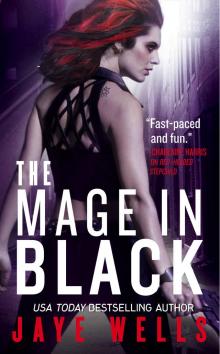 The Mage in Black
The Mage in Black Volatile Bonds
Volatile Bonds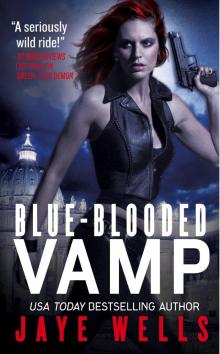 Blue-Blooded Vamp
Blue-Blooded Vamp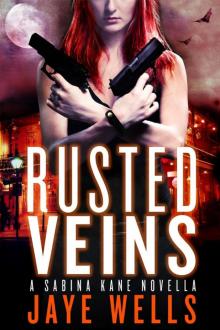 Rusted Veins
Rusted Veins Silver-Tongued Devil
Silver-Tongued Devil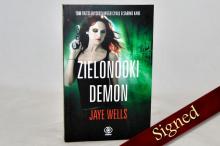 Green-Eyed Demon
Green-Eyed Demon Meridian Six
Meridian Six Fool's Gold
Fool's Gold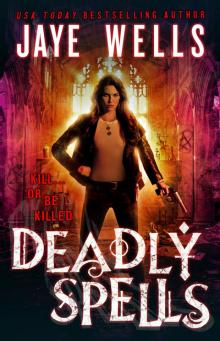 Deadly Spells
Deadly Spells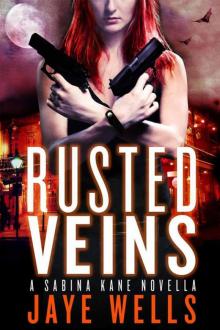 Rusted Veins: A Sabina Kane Novella
Rusted Veins: A Sabina Kane Novella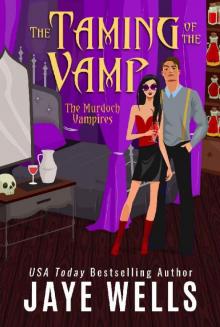 The Taming of the Vamp
The Taming of the Vamp Fire Water
Fire Water Violet Tendencies
Violet Tendencies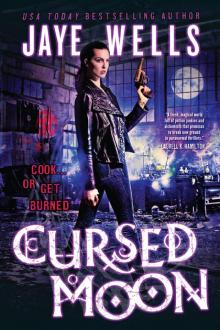 Cursed Moon
Cursed Moon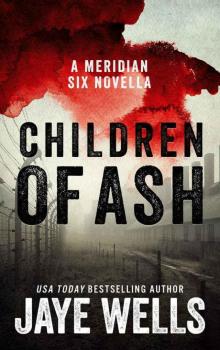 Children of Ash: A Meridian Six Novella
Children of Ash: A Meridian Six Novella The Art of Loving a Vampire (The Murdoch Vampires Book 1)
The Art of Loving a Vampire (The Murdoch Vampires Book 1)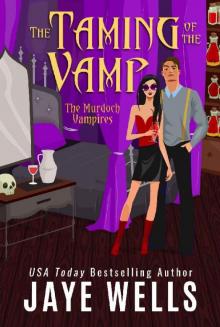 The Taming of the Vamp (The Murdoch Vampires Book 2)
The Taming of the Vamp (The Murdoch Vampires Book 2) The Art of Loving a Vampire
The Art of Loving a Vampire Dirty Magic
Dirty Magic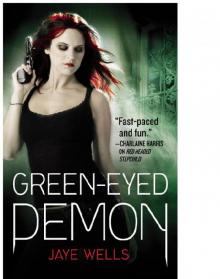 Green-Eyed Demon (Sabina Kane #3)
Green-Eyed Demon (Sabina Kane #3)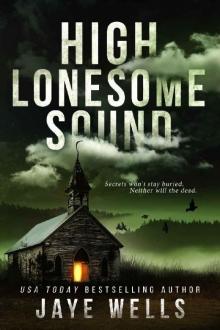 High Lonesome Sound
High Lonesome Sound